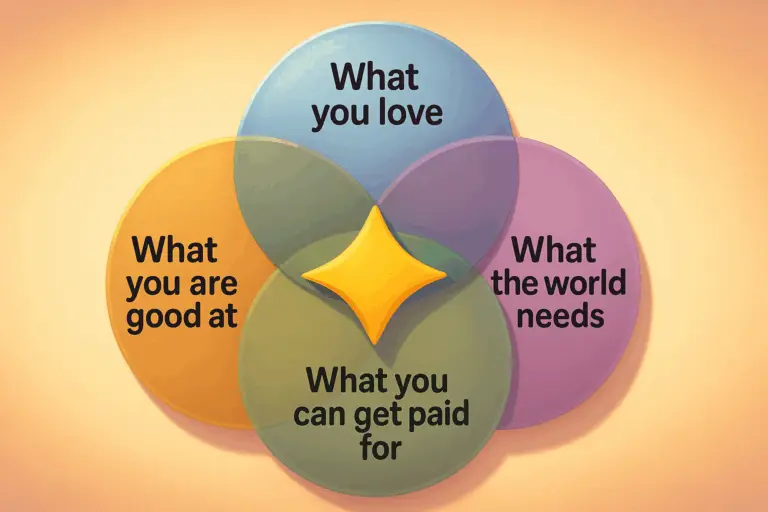
What if making money didn’t mean giving up who you are?
What if you could build income around something you actually enjoy — without burning out, pretending to be someone else, or forcing yourself to follow someone else’s path?
I’ve always believed in doing what I like — because I know I’ll do it well.
There are always going to be problems along the way, but when I’m working on something I care about, I’m more motivated to solve them. That mindset has quietly guided every choice I’ve made — from studying English in university (even when people questioned it), to starting my first jewelry shop while I was still a student, to how I work today.
This belief eventually led me to something deeper — a Japanese concept called “Ikigai”. And once I understood it, everything I was doing started to make a lot more sense.
What Is Ikigai?
Ikigai (生き甲斐) translates loosely to “a reason for being.”
It’s a simple yet powerful way to connect what you love with how you live — and how you earn.
Your Ikigai sits at the intersection of 4 things:
1.What you love
2.What you’re good at
3.What the world needs
4.What you can be paid for
When you can align these elements, work starts to feel more natural. Even if it’s hard, it doesn’t feel forced. Even if you’re tired, you still want to keep going. That’s the magic of building a business or side hustle based on Ikigai.

Why You Should Learn How to Make Money from What You Love
If you’re working a full-time job and trying to build something on the side, you already know how precious your time and energy are. That’s why alignment matters.
When you choose something you don’t care about just because it looks profitable, it’s easy to quit when it gets hard. But if you start with something you love — something you’re already drawn to — you’re more likely to stay with it, evolve with it, and grow into it.
You don’t need to be an expert from day one. You just need to be honest about what lights you up — and start from there.
Real Examples of How to Make Money from What You Love
Here are a few ways people have turned their Ikigai into income:
- A wellness lover turned her passion into personalized fitness plans
- A bookworm created a reading-based subscription box
- A pet owner designed portable products for traveling with animals
- A beauty enthusiast built a social channel reviewing makeup for specific skin types
- A creative artist turned hand-drawn jewelry into a custom product line
Each of these ideas came from the same place: a personal spark — turned into something useful.
How to Make Money from What You Love
1. Reflect on Your Ikigai
Use these prompts to get clear:
- What do I genuinely love doing — even if no one pays me for it?
- What am I naturally good at, or what do others come to me for?
- What problems do I notice that I actually care about solving?
- What could I offer that someone might pay for?
Even if you only have two or three answers right now, you’re already starting.
2. Research What People Are Already Looking For
Step 1: Ask Real People (Surveys or Polls)
Before we guess what people need, let’s just ask.You can use free tools like Google Forms or SurveyMonkey
Step 2: Explore Online Trends
After hearing from real people, let’s zoom out and see what the internet is saying.
Trend and keyword research helps you:
- Spot rising interest in your niche
- Understand the exact words people are searching with
- Get ideas for digital products, blog posts, or offers
This step helps make sure your idea has real potential.
Use tools like:
- Google Trends – to check rising search topics
- Pinterest or YouTube search bars – to see popular ideas
- Reddit and Quora – to read real, unfiltered questions
- AnswerThePublic /Ubersuggest – for keyword ideas
- Facebook groups or TikTok hashtags – to spot trending conversations
When your interests overlap with real needs, you’re on the right track!
3. Research How to Know What People Will Pay For
5 Simple Options to Validate the “Paid For” Part of Your Ikigai
Option 1: Look at What’s Already Selling
Before creating something new, take a look at what’s already working.
You’ll start to notice patterns — certain products, styles, or services people are already buying.
Option 2: Search for Paid Keywords
Use keyword tools to see what people are actively searching for with purchase intent.
Option 3: Ask Your Audience or Communities
You don’t need a big following. Just start by asking.
Even a small handful of honest replies can guide your decision.
Option 4: Look at Reviews and Complaints
Go to the review section of similar products or services and read what people love and what they wish was better.
Option 5: Test It with a Simple MVP (Minimum Viable Product)
You don’t have to wait until everything is perfect to start.
In fact, it’s better if you don’t.
Try offering a small, simple version of your idea — just enough to test if people are interested and willing to pay.
This is called an MVP (Minimum Viable Product). It’s not your final product — it’s your first version, created to learn what works.
4. Put It All Together
You’ve explored each part of your Ikigai — now it’s time to connect the dots and make it happen!
✨ Final Thought
Until now, I still believe in doing what you love — because when you truly enjoy something, you’re more likely to stick with it, even when it gets hard. But love alone isn’t always enough. You also need to find that sweet spot — the place where your passion meets a real need in the market.
That’s what Ikigai helps you uncover.
It’s not about chasing trends or forcing yourself into someone else’s path. It’s about tuning into what lights you up — and matching it with where demand exists, so earning becomes not just possible, but sustainable.
This is the approach I come back to, again and again.
Let’s keep shaping our own paths, slowly, honestly — one twist at a time.
Want to Try This Yourself?
I’ve created a free workbook to help you apply the Ikigai method to your own life and ideas — whether you’re just brainstorming or ready to launch something new.
Get your “Let’s Make Money from What You Love” ✨⬇️ E-book Below ⬇️✨
Inside, you’ll find:
more case studies and real-life examples to inspire your own ideas
Step-by-step market research guidance, including tools to help you discover what people truly need (free and paid options)
- How to do market research to understand what people will actually pay for



